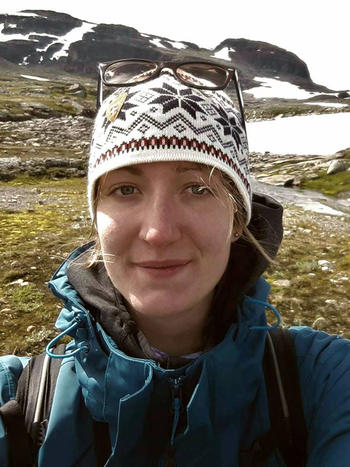M.Sc. Charlotte Läuchli

Department of Earth Sciences
Institute of Geological Sciences
Tectonics and Sedimentary Systems
PhD Candidate
Room B 133
12249 Berlin
Motivation
I am a scientist interested in deep-marine sedimentary records as archives for climate and tectonic conditions of the past. Investigating how environmental signals propagate from continents to deep-sea environments and extracting information regarding paleo-conditions on continents from deep-marine sedimentary archives are crucial considering the high preservation potential and the high resolution of such deposits. The ocean floor, and more precisely the interface between marine sediments and seawater, is a challenging object of study as it is also the locus of key reactions in the geochemical cycling of elements. Studying sediments deposited in deep-marine settings is thus necessary for our understanding of earth surfaces processes, paleo-environmental and paleo-climatic reconstructions, and to constrain global geochemical cycles of the past.
With a background in sedimentology, I am using geochemical proxies as tracers for environmental signals and autogenic processes in deep-marine sedimentary deposits. During my studies, I moved from large-scale archives with a master thesis focusing on the deep-marine Eocene deposits of the Ainsa basin, to millennial timescale with the study of Quaternary sediments offshore Chile for my current PhD project.
Education and experience
|
Feb. 2019 till date |
PhD candidate at the Freie Universität Berlin – Tectonic and Sedimentary Systems/ GFZ Potsdam – Earth Surface Geochemistry |
|
Oct. - Dec. 2018 |
Consultant as Data analyst at the UNEP/GRID-GENEVA |
|
April - July 2018 |
Internship at the UNEP/GRID-Geneva for the MapX application |
|
Fall 2018 |
Complementary certificate in Geomaticsat the University of Geneva |
|
2015 - Jan. 2018 |
Master degree in Geology at the University of Geneva |
|
March 2017 |
European Regional Finals of the AAPG Imperial Barrel Award 2017 competition |
|
2008 – 2012 |
Bachelor degree in Earth and Environmental Science - University of Geneva / University of Ottawa (Exchange year) |
Awards and fellowships
- Award of the Excellence Master Fellowshipfrom the University of Geneva – 2015
My PhD project, supervised by Anne Bernhardt (FU-Berlin) and performed in close collaboration with Hella Wittmann-Oelze (GFZ-Potsdam), Dirk Sachse (GFZ-Potsdam), Patrick Frings (GFZ-Potsdam) and Nestor Gaviria-Lugo (GFZ-Potsdam) investigates the fate of geochemical signals produced on land in marine archives.
Through a multi-proxy approach based on (1) carbon and hydrogen isotopes of biomarkers leaf wax n-alkanes, (2) lithium stable isotopes, and (3) meteoric cosmogenic 10Be/9Be, I aim to reconstruct past environmental conditions in Chile since the Last Glacial Maximum and investigate the mechanisms altering geochemical signals produced on land in marine sediments.
This project is part of the EarthShape research initiative in which German and Chilean collaborators aim to clarify the complex interaction between biotas and the earth surface (Project 5II: SECCO - Chile).
Peer-reviewed papers:
Läuchli, C., Gaviria‐Lugo, N., Bernhardt, A., Wittmann, H., Sachse, D., Mohtadi, M., ... & Frings, P. J. (2025). Constraints on the role of marine authigenic clay formation in determining seawater lithium isotope composition. Geochemistry, Geophysics, Geosystems, 26(3), https://doi.org/10.1029/2024GC012099
Gaviria-Lugo, N., Läuchli, C., Wittmann, H., Bernhardt, A., Frings, P., Mohtadi, M., ... & Sachse, D. (2023). Climatic controls on leaf wax hydrogen isotope ratios in terrestrial and marine sediments along a hyperarid-to-humid gradient. Biogeosciences, 20(21), 4433-4453.
Läuchli, C., Garcés, M., Beamud, E., Valero, L., Honegger, L., Adatte, T.,Spangenberg, J. E., Clark, J., Puigdefàbregas, C., Fildani, A., de Kaenel, E., Hunger, T., Nowak, A., Castelltort, S. (2021). Magnetostratigraphy and stable isotope stratigraphy of the middle-Eocene succession of the Ainsa basin (Spain): new age constraints and implications for sediment delivery to the deep waters. Marine and Petroleum Geology, p. 105-182.
Conference abstracts:
2021
Läuchli, C., Gaviria-Lugo, N., Bernhardt, A., Wittmann, H., Sachse, D., Frings, P.J. (2021). New insights into the behavior of lithium isotopes in the clay-size fraction of marine sediments. Goldschmidt virtual 2021. Oral presentation.
Gaviria-Lugo, N., Läuchli, C., Bernhardt, A., Wittmann, H., Sachse, D., Frings, P.J. (2021). Lithium isotopes in exchangeable and silicate fractions of clay sized fluvial sediments along a climatic transect. Goldschmidt virtual 2021.
Gaviria-Lugo, N., Läuchli, C., Wittmann, H., Bernhardt, A., Frings, P.J., Sachse, D. (2021). Assessing the fidelity of leaf wax signals in marine sediments: n-alkane sensitivity to change along a precipitation gradient. EGU General Assembly 2021, online.
2018
Läuchli, C., Garcés, M., Beamud, E., Valero, Adatte, T.,Spangenberg, J. E., Honegger, L., Clark, J., Puigdefàbregas, C., Fildani, A., Hunger, T., Nowak, A., Castelltort, S. (2018).Magnetostratigraphy and stable isotopes stratigraphy of the middle-upper Eocene deposits of the Ainsa basin (Spain): new age constraints and implications for Pyrenean mountain building. EGU, 2018. Poster.
2016
Läuchli, C., Garcés, M., Valero, L., Clark, J., Puigdefàbregas, C., Adatte, T., Castelltort, S. (2016). Multiproxy approach to climate signals in the middle-upper Eocene deposits of the Ainsa Basin, Spain. 14th Swiss Geoscience Meeting, Geneva. Poster.